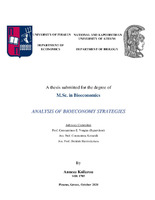Analysis of bioeconomy strategies
Ανάλυση στρατηγικών βιοοικονομίας

Master Thesis
Συγγραφέας
Κολλάρου, Αννέζα
Kollarou, Anneza
Ημερομηνία
2020-10Επιβλέπων
Βοργιάς, ΚωνσταντίνοςVorgias, Constantinos
Προβολή/
Λέξεις κλειδιά
Bioeconomy ; Sustainability ; European Bioeconomy Strategy ; Mediterranean Basin ; France ; Italy ; Spain ; Greece ; Circular bioeconomy ; National strategies ; Key goals ; Priority areasΠερίληψη
Τις τελευταίες δεκαετίες, ο πλανήτης μας αντιμετωπίζει όλο και περισσότερες παγκόσμιες προκλήσεις, όπως η αύξηση του πληθυσμού παγκοσμίως, η εξάντληση των ορυκτών πρώτων πόρων, η ανεπαρκής παραγωγή τροφίμων, η κλιματική αλλαγή και πολλά περιβαλλοντικά προβλήματα. Ως αποτέλεσμα, η εφαρμογή της βιώσιμης βιοοικονομίας θεωρείται ως μια γενική λύση από τη φύση της.
Ωστόσο, η βιοοικονομία είναι μια πολυδιάστατη έννοια που περιλαμβάνει οικονομική, περιβαλλοντική και κοινωνική διάσταση και δεν υπάρχει καθολικά συμφωνημένος ορισμός. Εξαρτάται από την προοπτική κάποιου και το πεδίο που εμπλέκεται. Έτσι, διεθνείς οργανισμοί και κυβερνήσεις, προσπαθούν να ορίσουν την έννοια της κυκλικής και βιώσιμης βιοοικονομίας. Από αυτούς τους ορισμούς, νομοθεσίες, πολιτικές και στρατηγικές, αναπτύσσονται και εφαρμόζονται συνεχώς, και αυτός είναι ακριβώς ο λόγος για τον οποίο ο ορισμός της βιοοικονομίας είναι κρίσιμος.
Η έννοια της βιοοικονομίας χρειάστηκε αρκετά χρόνια για να ωριμάσει ως πολιτική στρατηγική και παγκόσμια ιδέα. Ως εκ τούτου, μια παγκόσμια ανοδική τάση στην ανάπτυξη της πολιτικής βιοοικονομίας συνεχίστηκε από το 2015. Βασικά, για να επιτευχθεί παγκόσμια εφαρμογή της αειφορίας, η βιοοικονομία πρέπει να γίνει η κατευθυντήρια ιδέα σε επίπεδο κάθε χώρας.
Η ανάπτυξη της βιοοικονομίας ως εθνικής στρατηγικής εξαρτάται από τις διάφορες αλληλεπιδράσεις μεταξύ των διαφόρων παραγόντων όπως δημόσιοι και ιδιωτικοί φορείς, πρωτογενείς τομείς, νέες τεχνολογίες και ανθρώπινοι πόροι, καινοτόμες έρευνες, παράγοντες ζήτησης και κοινωνίας. Κάθε χώρα πρέπει να ακολουθεί ένα βασικό σύνολο αρχών που περιλαμβάνει λογοδοσία, διαφάνεια, συμμετοχή στη διαμόρφωση στρατηγικής,
αποτελεσματικότητα, συνοχή, δικαιοσύνη, καθώς και να αναπτύσσει τις πολιτικές της πρωτοβουλίες.
Ως αποτέλεσμα της γενικής έννοιας της βιοοικονομίας, η πρώτη Ευρωπαϊκή Στρατηγική Βιοοικονομίας ανακοινώθηκε το 2012 με στόχο μια βιώσιμη, κυκλική βιοοικονομία σε ολόκληρη την Ευρώπη, μια ευθυγράμμιση του οικονομικού-τεχνο-κοινωνικο-περιβαλλοντικού τοπίου, βελτιστοποίηση των επιπτώσεων σε τομείς της βιοοικονομίας. Με αυτόν τον τρόπο, η στρατηγική βιοοικονομίας σκοπεύει να προσφέρει μια μακροπρόθεσμη ισορροπία οικονομικών, περιβαλλοντικών και κοινωνικών κερδών, συνδυάζοντας τη βιώσιμη χρήση ανανεώσιμων πόρων για ζωοτροφές, τρόφιμα, βιολογικά προϊόντα και βιοενέργεια, με την αποκατάσταση και προστασία της βιοποικιλότητας, των οικοσυστημάτων και φυσικών πόρων σε νερό και γη στην Ευρώπη και πέραν αυτής.
Λαμβάνοντας υπόψη τη σημασία της αποκεντρωμένης και τοπικής διάστασης της βιοοικονομίας, αναλύονται τρεις διαφορετικές ευρωπαϊκές χώρες του Νότου και συγκεκριμένα της Μεσογειακής λεκάνης, της Γαλλίας, της Ιταλίας και της Ισπανίας. Συγκεκριμένα, παρατίθενται η στρατηγική που σχετίζεται με τη βιοοικονομία, ο συντάκτης της, οι βασικοί στόχοι, οι τομείς προτεραιότητας, το σχέδιο δράσης, καθώς και τα μέτρα για την προώθηση της στρατηγικής κάθε χώρας.
Στο τελευταίο μέρος της διατριβής, δίνεται έμφαση στην Ελλάδα ως ευρωπαϊκή χώρα καθώς και στην προοπτική της βιοοικονομίας της Ελλάδας.
Λαμβάνοντας υπόψη τη σκληρή οικονομική κρίση από το 2009, παρουσιάζονται στρατηγικές που σχετίζονται με τη βιοοικονομία, καθώς και οι βασικοί τους στόχοι και οι τομείς προτεραιότητας. Επιπλέον, εντοπίζονται ορισμένες προτάσεις που μπορούν να στηρίξουν τη βιοοικονομία και να ενισχύσουν την Ελλάδα γενικά.


